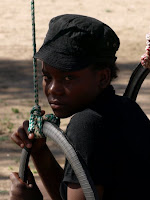 We spent our final ministry days in Windhoek visiting the hospital, a children’s home, and spending a day with the students at Pneumatics, a ministry & theology school connected with Emmanuel Church. I also introduced them to Joe's Beerhouse for Drew's birthday. :) Thursday evening, we said goodbye to the team at the airport where they had to wait another 8 hours for their delayed flight. Then Japie, the national OM director, Stephanie and Caryn, two OM volunteers, and I made the quiet trip back to Okahandja and everyday life.
We spent our final ministry days in Windhoek visiting the hospital, a children’s home, and spending a day with the students at Pneumatics, a ministry & theology school connected with Emmanuel Church. I also introduced them to Joe's Beerhouse for Drew's birthday. :) Thursday evening, we said goodbye to the team at the airport where they had to wait another 8 hours for their delayed flight. Then Japie, the national OM director, Stephanie and Caryn, two OM volunteers, and I made the quiet trip back to Okahandja and everyday life.Having the American team here was sometimes great fun, sometimes head-shaking, but always educational. Because I was an American familiar with Namibia my niche quickly became the liaison between Japie and the team. And since I’ve led so many groups over here, one of my greatest joys was interacting with the team leaders, hopefully helping them learn to be better leaders through the whole process.
I haven’t done much college aged ministry up to this point, but I really enjoyed it these past weeks. They were eager to learn and familiar with the intellectual rhetoric that I’m sure I’ve confused many a high school student with. College students are often independent for the first time and are making decisions on how the values they’ve developed in high school will play out in real life. They’re responsible for their own actions so the learning curve is steep and costly, but that much more effective. I think I may have to pursue this area of ministry further when I get back to NH.
Now with the team gone it’s back to my familiar ministries. It’s been almost a month and a half since I’ve seen the kids in our Bible Study at Okahandja Secondary because they had their school holiday then I left with the team. It feels like forever since I’ve hung out with the kids at the Ark. And it’s hard to remember the last time I was in church. I’m looking forward to getting back involved in what’s become my daily grind. Assuming nothing comes up in the meantime (which could be a stretch), I should be here in Okahandja until the team comes in July.














